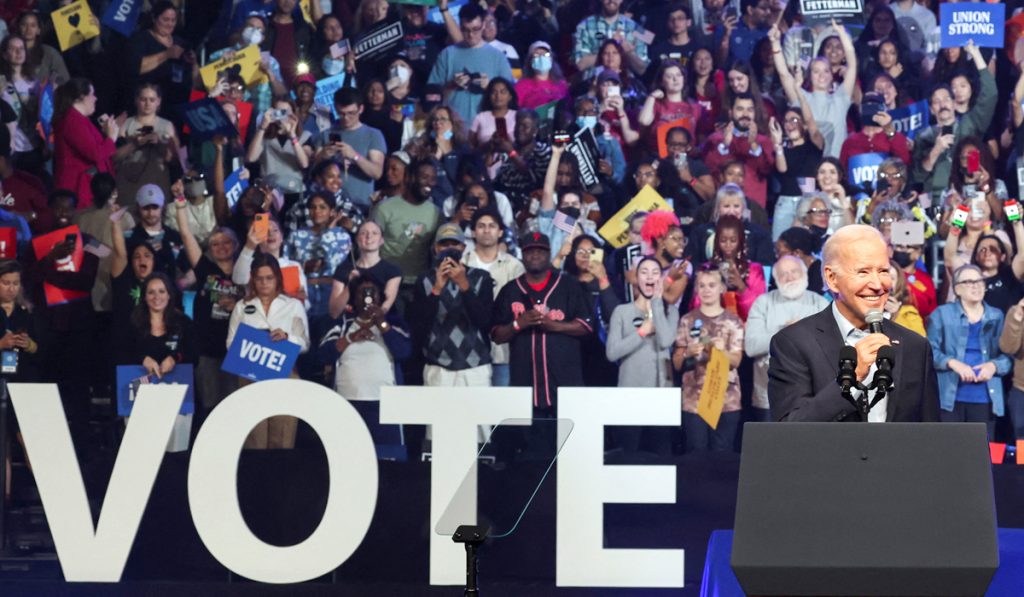Biden falls flat against Trump in first 2024 US presidential debate
The question of whether Donald Trump can win the 2024 US presidential election is both intriguing and contentious, reflecting the polarized nature of American politics. Trump’s potential path to victory involves a complex interplay of factors, including his base of support, the political landscape, and the strategies of his opponents. Analyzing these elements can provide insights into the feasibility of a Trump comeback.
Trump’s Base and Its Loyalty
One of Trump’s most significant advantages is his steadfast base. Throughout his presidency and beyond, Trump has maintained a remarkably loyal following. This base, characterized by its enthusiasm and engagement, forms the core of his political strength. Despite controversies and challenges, Trump’s supporters have remained loyal, often viewing him as a political outsider fighting against a perceived establishment.
This loyalty is evident in various metrics, including rally attendance, social media engagement, and small-dollar donations. Trump’s ability to mobilize this base is a crucial asset. However, the question remains whether this core group is sufficient to secure a national victory.

The Political Landscape in 2024
The political landscape in 2024 will be vastly different from that of previous elections. Several factors will shape the context in which Trump will compete:
The State of the Economy: Economic conditions play a pivotal role in presidential elections. Should the economy be performing well, the incumbent party often benefits. Conversely, economic struggles can create an opening for challengers. Trump will need to position himself as the candidate capable of delivering economic stability and growth.
Public Health and Pandemic Response: The handling of the COVID-19 pandemic remains a critical issue. Voters’ perceptions of how the Biden administration managed the pandemic, compared to Trump’s own approach, will influence their decisions. A successful vaccine rollout and recovery could bolster the incumbent, while ongoing challenges could benefit Trump.
Social and Political Issues: Issues such as immigration, healthcare, and racial justice will continue to be central. Trump’s stance on these matters, and how they resonate with voters, will be key. His tough stance on immigration, for example, appeals to his base but may alienate moderate voters.
Electoral Reforms and Voting Laws: Changes in voting laws and regulations across various states could impact the election. Trump’s claims of electoral fraud in the 2020 election have led to legislative changes in several states, which could affect voter turnout and the overall election dynamics.
Opposition Strategies
The strategies employed by Trump’s opponents will significantly influence his chances. The Democratic Party will likely emphasize unity and stability, contrasting with the divisive nature of Trump’s rhetoric. They may focus on policy achievements and the benefits of continuity. Additionally, Democratic candidates will need to energize their base while appealing to swing voters and moderates disillusioned with Trump’s style.

Within the Republican Party, Trump’s dominance is evident, but not uncontested. Potential primary challengers could emerge, seeking to present a different vision for the party. Figures like Florida Governor Ron DeSantis and former Vice President Mike Pence could present significant challenges. The primary season will test Trump’s ability to unify the party behind his candidacy.
President Joe Biden and Donald Trump have squared off in the first debate of the 2024 United States presidential race, seeking to pull ahead in a match-up that has, so far, been in a dead heat.
But despite delivering the opening salvo in Thursday’s event, Biden struggled to articulate his points at several moments, appearing to fumble for his words.
Biden falls flat against Trump: Meanwhile, Trump took the opportunity to redirect the conversation at several points to Biden’s perceived weaknesses, drumming up fears about immigration and the state of the economy.
He also attempted to dodge questions about whether he would honour the results of November 5’s presidential election, saying he would only do so if it was “fair” and “free” – and then reiterating false claims that the 2020 election was rigged.
“The fraud and everything else was ridiculous,” he said at one point, casting doubt on President Biden’s win in 2020.
Trump currently faces two criminal indictments – one in Georgia and another in Washington, DC – over his alleged attempts to subvert those election results.
Media and Communication
Trump’s mastery of media and communication remains a formidable tool. His use of social media, rallies, and unconventional communication methods allows him to set the narrative and mobilize supporters effectively. However, the media landscape has evolved, with social media platforms implementing stricter regulations and traditional media outlets being more scrutinized. Trump’s ability to navigate these changes will be crucial.
Key States and Voter Demographics
Winning the 2024 election will hinge on key battleground states and voter demographics. States like Pennsylvania, Michigan, Wisconsin, and Arizona, which were pivotal in the 2020 election, will once again be critical. Trump’s strategy will need to focus on winning back disaffected voters in these regions.

Demographic shifts, such as changes in suburban voting patterns and the growing influence of minority voters, will also play a significant role. Trump’s ability to appeal to these changing demographics will be essential. Efforts to broaden his appeal beyond his traditional base could be a deciding factor.
Legal and Ethical Challenges
Trump faces several legal and ethical challenges that could impact his campaign. Ongoing investigations and potential legal battles may affect public perception and voter confidence. These issues could be leveraged by opponents to question his suitability for office. However, Trump’s ability to frame these challenges as political witch hunts could rally his base further.
Can Trump win the 2024 US election? The answer lies in a multitude of factors, each interacting in complex ways. His loyal base provides a strong foundation, but expanding his appeal to a broader electorate will be crucial. The political landscape, including economic conditions and social issues, will shape voter sentiment. Opposition strategies, media dynamics, and key states will all play pivotal roles.
Ultimately, Trump’s ability to navigate these challenges, capitalize on his strengths, and address his weaknesses will determine his prospects. The 2024 election promises to be a highly contested and closely watched event, reflecting the deep divisions and dynamic nature of American politics.








